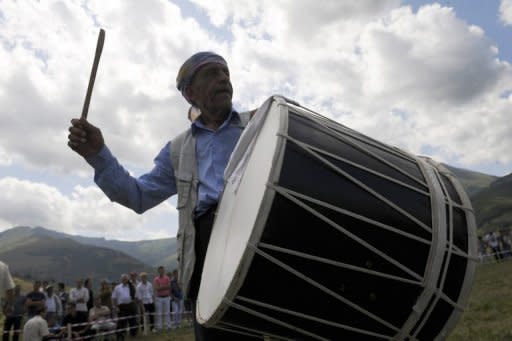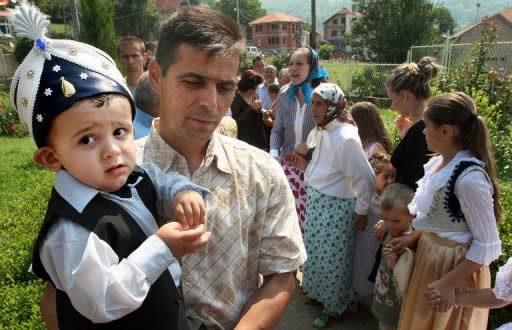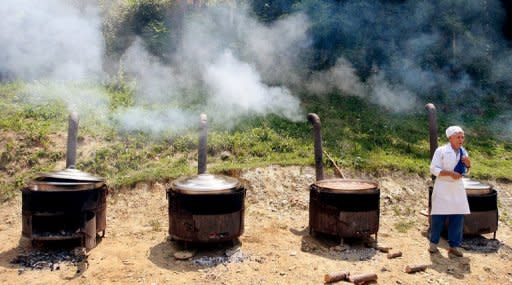Kosovo hamlet clings to tradition with mass circumcision
In a tiny Muslim hamlet deep in the mountains of south Kosovo, the cries of young boys usher in the dawn once every five years in a ritual of mass circumcision to set them on their journey to manhood. Both a solemn and festive event, a five-man band playing traditional flutes and drums -- known as zurla and goc -- follow a dozen men led by a local imam and a barber who make their way from house to house in the village of Lubinje. Abdil Bajrami, a 90-year-old patriarch, brims with excitement. His two-year-old great-grandson Eldis will be circumcised along with 90 other local boys from 10 months to five years old in a centuries-old ritual known as Sunet. "Sunet means Eldis is accomplishing two things today: he is starting his life as a man and as a Muslim," Bajrami told AFP. The ceremony used to be practiced throughout the area but Lubinje, with its 6,000 residents, is now the only village keeping up the tradition. "No one knows when it began," Abdil said. "I was circumcised in the same way when I was six-years-old and remember my father and grandfather telling me the same for themselves and their fathers and grandfathers," he said. The music stops abruptly and a tense silence sets in as the procession enters Bajrami's two-storey house on a steep, narrow street. Only men are allowed to enter the room where the barber, who doubles as local circumciser, readies to perform the brief ritual without anaesthetic. Women in the family wait anxiously in a side room, notably Eldis' mother Sheherzada, 28, who falls into a kind of trance performing another age-old tradition, turning a rolling pin quickly and rhythmically between her hands. Local lore holds that this way a mother can remove a son's pain during the circumcision. Suddenly a short scream breaks the silence. It is quickly followed by men chanting "Allahu akbar" (God is greater) and "La Ilahah Illa Allah" (There is no God but God), signalling that the young Eldis has gone through the rite, which is obligatory for Muslims. The music starts up again and the women rush forward to give the honoured visitors the towels tradition demands before the men set off to perform the next circumcision. Wiping away her tears of joy, Sheherzada enters Eldis' room, kneeling by his bed and kissing her son's hand as his father gushes with pride. "I am the happiest man in the world today," said 30-year-old Ersan. "I have lived for this," he added, then heads out to grill meat for guests packed onto the Bajramis' huge terrace overlooking the entire village, likewise filled with visitors come to celebrate with the families of the newly circumcised boys. Lubinje residents call themselves Bosniaks -- a term usually used for Bosnian Muslims -- though outsiders refer to them as Gorani. They are part of a small Muslim community that settled along the Kosovo boundary with Macedonia, some 120 kilometres (74 miles) south of the capital Pristina. The Gorani have their own language, a mixture of Albanian, Macedonian, Serbian and Turkish called "Nasinski", which roughly translates as "our language". And they cling to traditions -- rather than politics -- to uphold their collective identity in this volatile region with a history of bloodshed. Sunet remains the prime example, deeply rooted in the soul of the village. "Sunet is the biggest event in every man's life," said Eldis' 54 year-old grandfather Feim. "You can get married once, twice, as many times as you want, but you can only make Sunet once." Locals feel the ritual has helped set them apart from other communities in multi-ethnic Kosovo, where more then 90 percent of 1.73 million inhabitants are Muslim. "We jealously guard the tradition as it is what makes us recognisable. It is a part of our identity," a journalist of the local Nasinski-language radio station, Refki Kasi, told AFP. "Stockholm has the Nobel prize, Hollywood the Oscar and we have the Sunet," he said, only half in jest. The mass circumcision kicks off a four-day feast in Lubinje that includes a village lunch, concerts and traditional sports dating back to Ottoman times in the Balkans -- tug-of-war, long jumping, Turkish wrestling and stone-throwing. As neighbours pass by to congratulate the Bajramis, great-grandfather Abdil greets them proudly. "Eldis is the 28th boy who was circumcised in the family of 60 members," he said. "I lived to see four generations of my family taking part in Sunet. It is the biggest fortune in my life."





